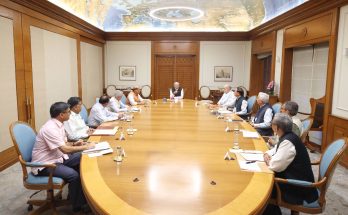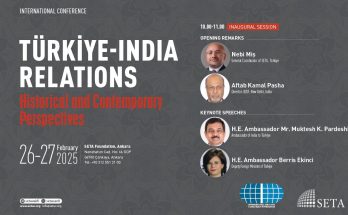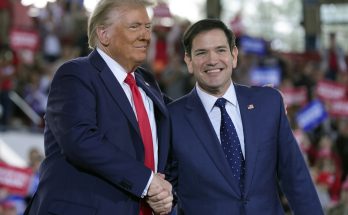
The theme of the recently concluded BRICS summit at Ufa, Russia, was titled “BRICS Partnership- a Powerful Factor of Global Development”. The focus thus was on strengthening cooperation in areas of common interest in the international economic and political agenda. In this context, there are three major takeaways for India from the Ufa Declaration- first, the focus on increasing trade-ties amongst BRICS nations; second, strengthening cooperation amongst BRICS in areas of Information, Communication, and Technology (ICTs); and third, India’s role at the United Nations.
Expanding Intra-BRICS Trade
 Barring China, which has cemented its place as the leading trading partner when it comes to intra-BRICS trade, economic ties between BRICS countries are surprisingly low. Take, for instance, India’s export to South Africa which actually fell from US$ 5106.93 million in 2012-13 to US$ 5076.94 million in 2013-14. Trends of India’s exports to Brazil and Russia are starker with a fall in exports standing at 8.3% and 6.46% respectively.
Barring China, which has cemented its place as the leading trading partner when it comes to intra-BRICS trade, economic ties between BRICS countries are surprisingly low. Take, for instance, India’s export to South Africa which actually fell from US$ 5106.93 million in 2012-13 to US$ 5076.94 million in 2013-14. Trends of India’s exports to Brazil and Russia are starker with a fall in exports standing at 8.3% and 6.46% respectively.
At Ufa, a concerted effort has been made to take corrective action. The two developments, that will bring joy to Indian business and Prime Minister Modi’s Make in India campaign, are: (i) the adoption of the Strategy for BRICS Economic Partnership which will be the basis for expanding cooperation in the areas of trade and investment; manufacturing and minerals processing; energy; agricultural; science, technology and innovation; financial cooperation; connectivity and ICT cooperation; and (ii) the creation of a platform of a joint discussion for trade cooperation amongst BRICS countries through enhanced dialogue between BRICS Export Credit Agencies (ECAs). In fact, the member nations have agreed to organize an annual BRICS ECA meeting to tap into the potential benefits of increased exports amongst BRICS and to other countries.
Focus on ICT
For the post-2015 agenda to be a success, the developing world will have to increasingly rely on rapid strides made in the ICT sector. The five emerging powers recognise this role and have acknowledged the immediacy of the situation by establishing a BRICS working group on ICT cooperation. In this context, their stance on the governance of the internet has also been made clear – all members believe that the internet is a global resource and that states should participate on an equal footing in its evolution and functioning.
This is a major boost for the Indian government’s Digital India initiative which seeks “to transform the entire ecosystem of public services through the use of information technology”. Even for the private sector, the potential of the internet sector is vast, and thus far only a fraction of it has been tapped. Both large industries like entertainment (only 5% of the audience is impacted by the internet) and travel (8%), and Small and Medium Enterprises, are yet to take full advantage of the internet. Further, even consumers lack education and knowhow to exploit the internet’s potential. The economic impact of collaboration amongst the five nations in this area can potentially revolutionise the way Indians live.
India & UN reforms
The Ufa declaration reiterates the centrality of the United Nations (UN) in global governance. It calls on the international community to further strengthen and expand the scope of the U.N. on matters ranging from international security, governance of the internet and the space-race to the world drug problem, and transnational organised crime. However, there is no mention of the official stance of member nations on India’s bid to secure a permanent seat at the United Nations Security Council (UNSC). While Russia and China have made clear that they see India (along with Brazil and South Africa) playing an important role at the UN, the document makes no mention of expanding the UNSC to include India. This complicates matters as the other three permanent members, United States, Britain, and France, have openly backed India’s claim.
The Way Ahead
Other notable features of the Ufa Declaration such as expanding the use of national currencies in transactions amongst BRICS (India and Russia are expected to announce an agreement by 2016), a Framework for BRICS E-Commerce Cooperation, and Strengthening IPR Cooperation amongst members, will substantially aid the ongoing recovery process of the Indian economy.
By collaborating with other emerging powers, particularly on initiatives such as the New Development Bank (NDB), the BRICS grouping provides India the platform to revitalise its economy, and reshape its profile in the world order. The Ufa summit was an important step in this direction and has set the stage for India’s presidency of the BRICS, starting February 2016.
(The author is a Research Assistant at Observer Research Foundation, New Delhi)
Author Profile
- India Writes Network (www.indiawrites.org) is an emerging think tank and a media-publishing company focused on international affairs & the India Story. Centre for Global India Insights is the research arm of India Writes Network. To subscribe to India and the World, write to editor@indiawrites.org. A venture of TGII Media Private Limited, a leading media, publishing and consultancy company, IWN has carved a niche for balanced and exhaustive reporting and analysis of international affairs. Eminent personalities, politicians, diplomats, authors, strategy gurus and news-makers have contributed to India Writes Network, as also “India and the World,” a magazine focused on global affairs.
Latest entries
 India and the WorldJune 26, 2025Operation Sindoor: India Sheds Restraint, Rediscovers Utility of Force
India and the WorldJune 26, 2025Operation Sindoor: India Sheds Restraint, Rediscovers Utility of Force India and the WorldJune 23, 2025BRICS summit in Rio to focus on Global South, local currency trade
India and the WorldJune 23, 2025BRICS summit in Rio to focus on Global South, local currency trade Africa InsightsJune 11, 2025New Opportunities in India-Japan Cooperation in Africa
Africa InsightsJune 11, 2025New Opportunities in India-Japan Cooperation in Africa India and the WorldMay 23, 2025Post-Operation Sindoor, India reminds Turkey, China of concerns and sensitivities
India and the WorldMay 23, 2025Post-Operation Sindoor, India reminds Turkey, China of concerns and sensitivities







